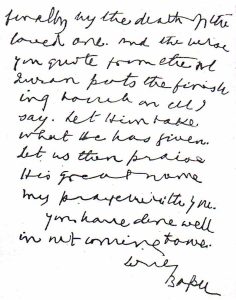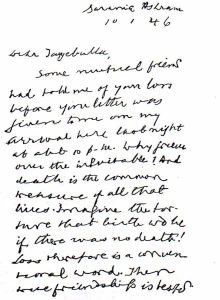By Omar Luther King
Gandhi Jayanti or the birth anniversary of Mahatma Gandhi (October 2) is the day to remember the tall man for his sacrifices. While talking of birth, life and death, it would be interesting to know what Mahatma Gandhi, the Father of the Nation, had to say about birth, life and death. Mohandas Karamchand Gandhi was popularly and affectionately called Bapu (meaning Daddy). On hearing about the death of my mother, Begum Afroza Tayyebulla, this is what Mahatma Gandhi, affectionately called Bapu, wrote to my father, Maulana M. Tayyebulla, a national freedom fighter and a Minister in the first Bordoloi Cabinet of united Assam (1947-1950) and Member of Rajya Sabha (1950-64):
Sarania Ashram
10-1-46
Dear Tayyebulla,
Some mutual friend had told me of your loss before your letter was given to me on my arrival here that night at about 10 p.m. Why grieve over the inevitable? And death is the common measure of all that lives. Imagine the torture that birth would be if there was no death! Loss therefore is a conventional word. Then true friendship is tested finally by the death of the loved one. And the verse you quoted from the eternal Quran puts the finishing touch on all I say. Let Him take what He has given. Let us then praise His great name. My prayer is with you.
You have done well in not coming to me.
Sincerely,
Bapu
Mahatma Gandhi’s Handwritten Letter


Mahatma Gandhi wrote the letter from an Ashram in Gauhati (now Guwahati) where he was staying on his Assam tour in January 1946. My father, then the President of Assam Congress (1940-48) was a Security Prisoner from the 9th August 1942 to March 1945, and since his release from prison he was living in a sort of exile, lone and far, in Nowgong (now Nagaon) town in Assam, as our own Gauhati house was still under forced Military occupation on account of the War.
I have donated the letter to the National Archives, Government of India, Janpath, New Delhi where it is on display for public viewing.
The letter that Gandhi wrote was in response to this letter that my father wrote to him:
M. Tayyebulla
Nowgong
8 January 1946
My dear Bapuji,
Having lost my wife on 26 December 1945…and having none at all to look after the little children…I could not – my wish notwithstanding – manage to leave for even one single day to go down to Gauhati to meet my Bapuji…”Inna lillahi wa inna illaihi rajiun: Verily we come from Allah and to Him we all return” (Al-Koran). Oh, what a difference to me, Bapuji! I pray to Allah for peace, and I hope Bapuji will pray too.
With taslim and love,
Yours affectionately,
Tayyebulla
To
Mahatma Gandhi
Sarania Ashram
Camp Gauhati
All that Bapu wrote in his letter to my father on my mother’s death applied to Gandhi as well. By the death of our beloved Bapu, ‘true friendship’ the world bore to him was indeed ‘tested finally’. Did not everybody from every nook and corner of the world realise Bapu’s message of non-violence? Did not the whole planet, as it were, pour forth its soul at the passing away of Gandhi? Gandhi, the Shaheed (martyr) of non-violence, by his death lives in the hearts of his people.
By non-violence, Gandhi emancipated India from bondage to freedom. Lo and behold, how the British Viceroy, the Lord Louis Mountbatten, coming soon after the Churchillian Viceroy, the Lord Linlithgow, became India’s own Quit India Governor General! Did not Louis quit the shores of India as India’s best friend in the whole of the United Kingdom? What a miracle! Non-violent Means have Non-violent End.



